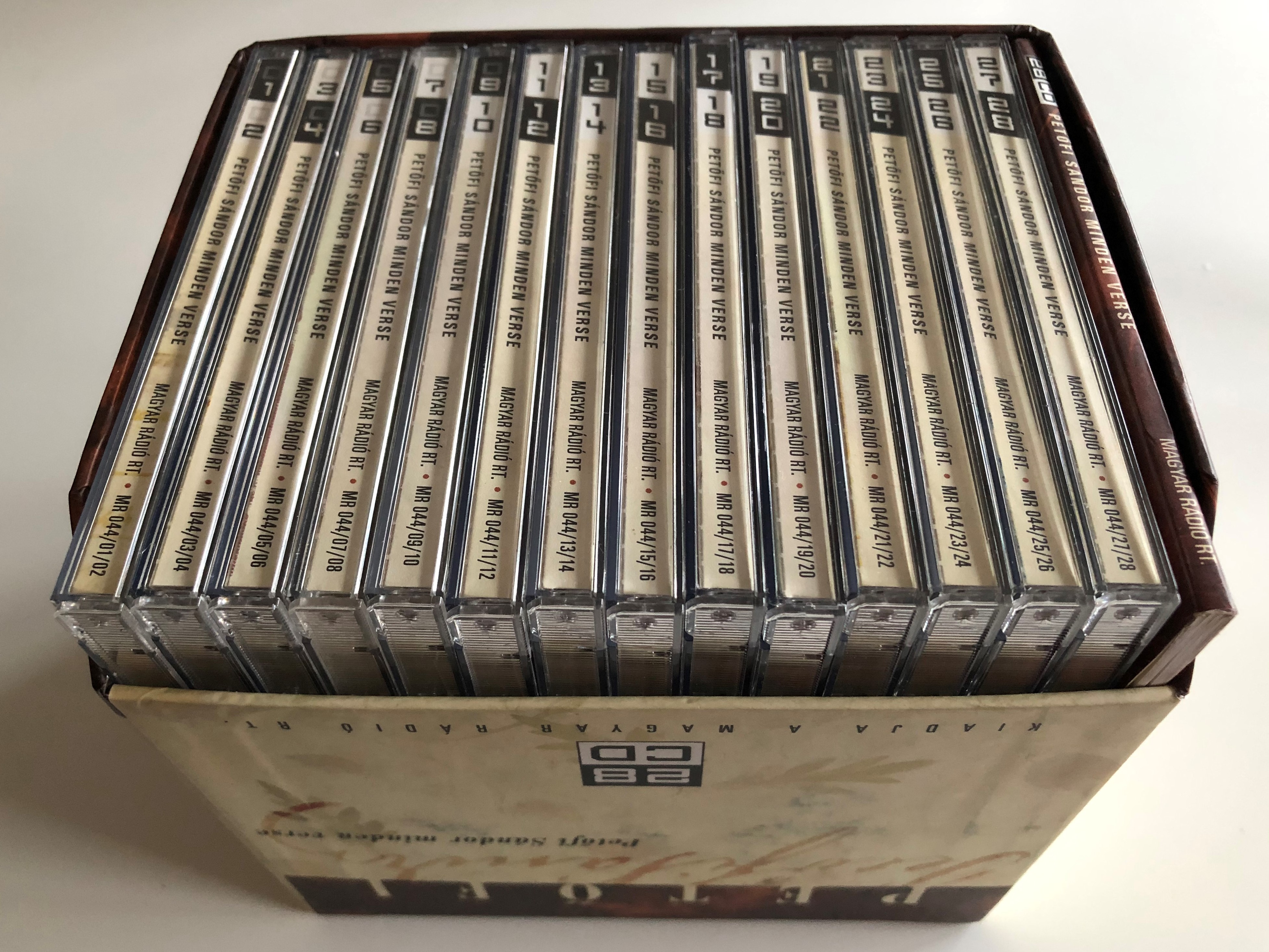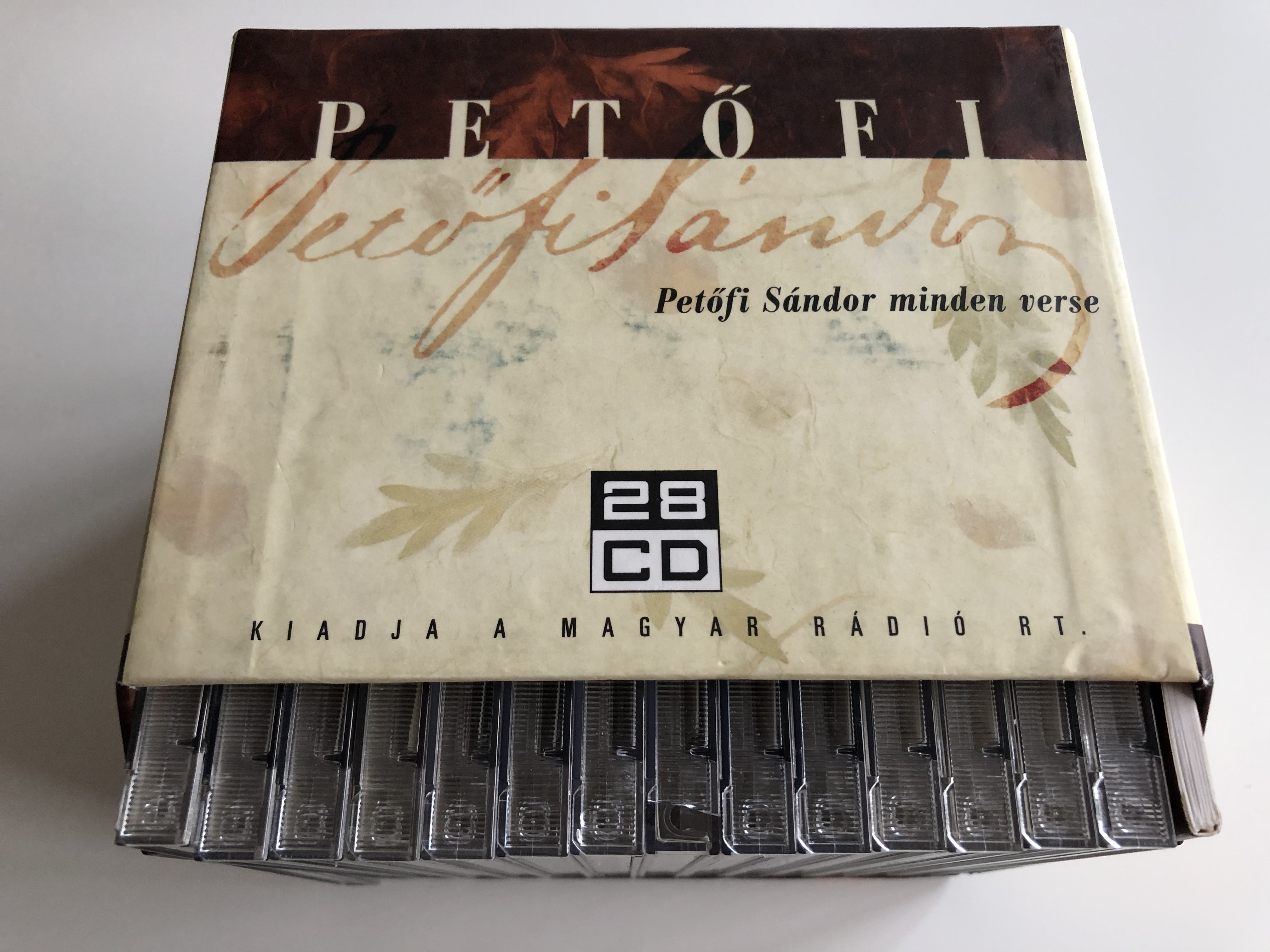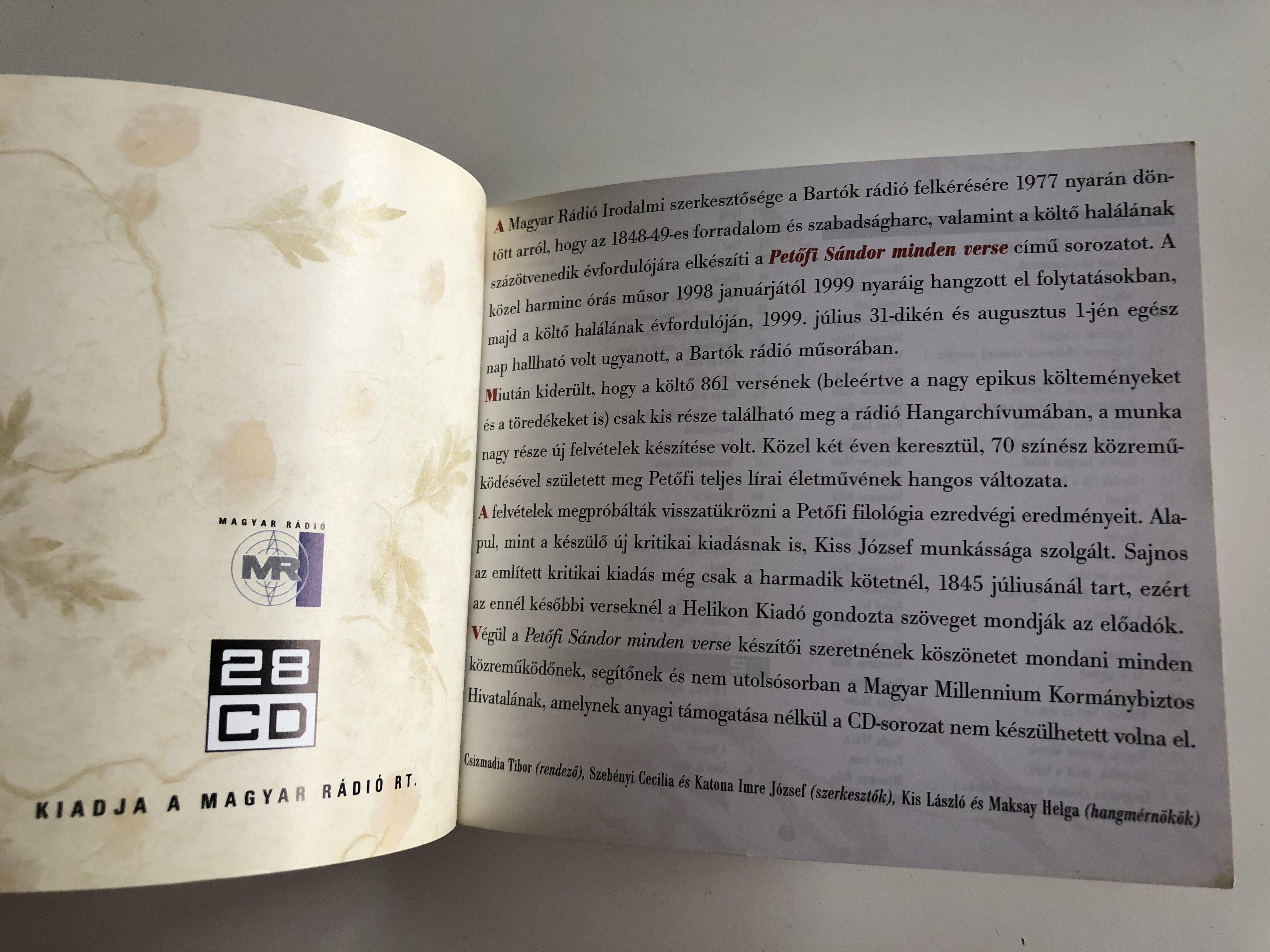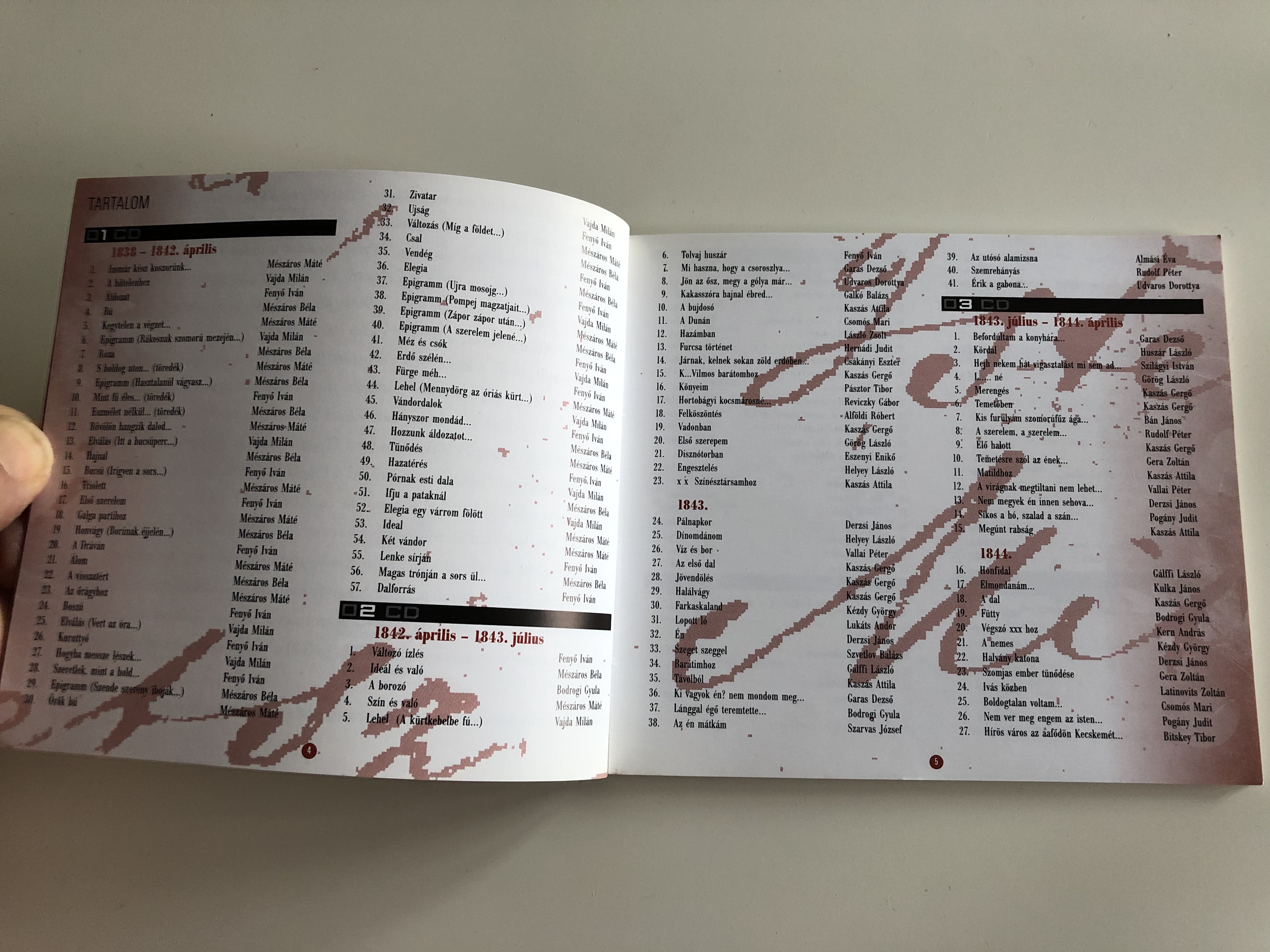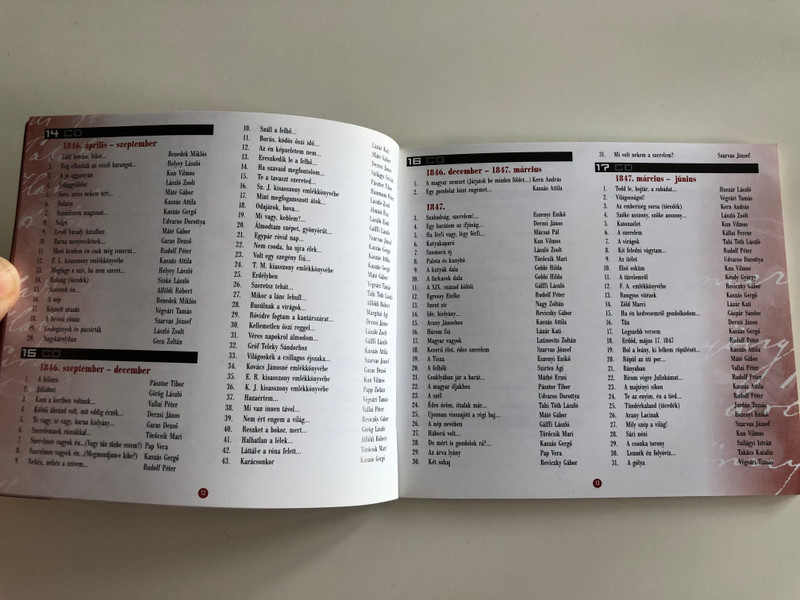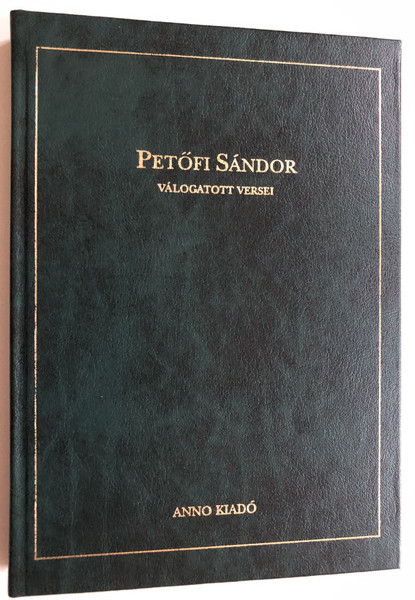Description
Petőfi Sándor minden verse - 28 részből álló CD sorozat / 28 Audio CD / Magyar Rádió Rt. és a Magyar Millenniumi Kormánybiztosi Hivatal / Complete 861 Poems / 70 Actors
(Petőfi Sándor CD Box)
Published in 2001
MR 2001
MR 044/01-28
Made in Hungary
Rendezo / Directed by Csizmadia Tibor
Szerkesztok / Arrangers: Szebényi Cecília és Katona Imre József
Voice ACTORS:
Kaszas Attila
Latinovics Zoltan
Csakanyi Laszlo
Haumann Peter
Szarvas Jozsef
Pasztor Tibor
Udvaros Dorottya
Hegedus D. Geza
Garas Dezso
Rudolf Peter
Bodrogi Gyula
Gobbi Hilda
Szirtes Agi
... altogether 70 actors
Made in Hungary
!!! Condition of this COLLECTOR'S CD BOX is USED VERY GOOD! All DISCS were checked and they are LIKE NEW !!! Perfect for collector's and libraries !!!
Sándor Petőfi ( Slovak: Alexander Petrovič; Serbian: Александар Петровић; 1 January 1823 – most likely 31 July 1849) was a Hungarian poet and liberal revolutionary. He is considered Hungary's national poet, and was one of the key figures of the Hungarian Revolution of 1848. He is the author of the Nemzeti dal (National Song), which is said to have inspired the revolution in the Kingdom of Hungary that grew into a war for independence from the Austrian Empire. It is most likely that he died in the Battle of Segesvár, one of the last battles of the war.
Petőfi Sándor (született Petrovics Sándor, Kiskőrös, 1823. január 1. – Fehéregyháza, 1849. július 31.) magyar költő, forradalmár, nemzeti hős, a magyar költészet egyik legismertebb és egyik legkiemelkedőbb alakja. Rövid élete alatt közel ezer verset írt magyarul, ebből körülbelül nyolcszázötven maradt az utókorra, és az ismertebbeket sok más nyelvre lefordították.
Kondor Katalin, a Magyar Rádió Rt. elnöke elmondta: Petőfi Sándor teljes lírai életműve hangzó változatának elkészítéséről döntöttek, voltaképpen a Magyar Rádió közszolgálati feladatainak teljesítését vállalta.
Nemeskürty István irodalomtörténész, a Magyar Millenniumi Kormánybiztosi Hivatal volt kormánybiztosa "megtisztelő feladatnak" nevezte, hogy az általa vezetett hivatal anyagilag és erkölcsileg is támogathatta a CD-sorozat megjelentetését.
Liptay Katalin, a Magyar Rádió irodalmi szerkesztőségének munkatársa az előzményekről elmondta: a Bartók rádió vezetői 1997 nyarán kezdeményezték az irodalmi szerkesztőségnél, hogy a szabadságharc és a költő halálának százötvenedik évfordulóján helyet és adási időt biztosítanának az 1993-ban elhangzott József Attila minden verse mintájára készült Petőfi összesnek. Sajnos ezt nem sikerült 1998-ra megvalósítani.
A szerkesztők - Szebényi Cecília és Katona Imre József - eredeti elképzelése szerint a Magyar Rádió archívumát szerették volna új felvételekkel kiegészíteni, de a teljes hanganyag meghallgatása után tapasztalniuk kellett, hogy a költő 861 költeményéből alig kétszáz volt megtalálható. - Közel kétéves munka és hetven színész közreműködésével született meg Petőfi Sándor teljes lírai életművének hangzó változata - közölte Csizmadia Tibor, a sorozat rendezője.
A magyar kultúra napját megelőző ünnepségen Kondor Katalin és Nemeskürty István több kulturális közintézmény és iskola képviselőinek átadta a Petőfi Sándor minden verse című, 28 részből álló CD- sorozatot.
Az ajándékozottak között volt az Eötvös Loránd Tudományegyetem, a Fővárosi Szabó Ervin Könyvtár Központi Könyvtára, a Petőfi Irodalmi Múzeum és Kortárs Irodalmi Központ, több budapesti és vidéki Petőfi Sándor nevét viselő iskola, valamint a kiskunfélegyházi Petőfi Sándor Emlékszoba és a kiskőrösi Petőfi Szülőház és Emlékmúzeum.
Poetry:
Petőfi started his career as a poet with "popular situation songs", a genre to which his first published poem, A borozó ("The Wine Drinker", 1842), belongs. It is the song of a drinker praising the healing power of wine to drive away all troubles. This kind of pseudo-folk song was not unusual in Hungarian poetry of the 1840s, but Petőfi soon developed an original and fresh voice which made him stand out. He wrote many folk song-like poems on the subjects of wine, love, romantic robbers etc. Many of these early poems have become classics, for example the love poem A virágnak megtiltani nem lehet ("You Cannot Forbid the Flower", 1843), or Befordultam a konyhára ("I Turned into the Kitchen", 1843) which uses the ancient metaphor of love and fire in a playful and somewhat provocative way.
The influence of folk poetry and 19th-century populism is very significant in Petőfi's work, but other influences are also present: Petőfi drew on sources such as topoi of contemporary almanac-poetry in an inventive way, and was familiar with the works of major literary figures of his day, including Percy Bysshe Shelley, Pierre-Jean de Béranger and Heinrich Heine.
Petőfi's early poetry was often interpreted as some kind of role-playing, due to the broad range of situations and voices he created and used. Recent interpretations however call attention to the fact that in some sense all lyrical poetry can be understood as role-playing, which makes the category of "role-poems" (coined especially for Petőfi) superfluous. While using a variety of voices, Petőfi created a well-formed persona for himself: a jaunty, stubborn loner who loves wine, hates all kinds of limits and boundaries and is passionate in all he feels. In poems such as Jövendölés ("Prophecy", 1843) he imagines himself as someone who will die young after doing great things. This motif recurs in the revolutionary poetry of his later years.
The influence of contemporary almanac-poetry can be best seen in the poem cycle Cipruslombok Etelke sírjára ("Branches of Cypress for Etelke's Tomb", 1845). These sentimental poems, which are about death, grief, love, memory and loneliness were written after a love interest of Petőfi's, Etelke Csapó, died.
In the years 1844–45 Petőfi's poetry became more and more subtle and mature. New subjects appeared, such as landscape. His most influential landscape poem is Az Alföld ("The Plains"), in which he says that his homeland, the Hungarian plains are more beautiful and much dearer than the Carpathian mountains; it was to become the foundation of a long-lived fashion: that of the plains as the typical Hungarian landscape.
Petőfi's poetic skills solidified and broadened. He became a master of using different kinds of voices, for example his poem A régi, jó Gvadányi ("The Good Old Gvadányi") imitates the style of József Gvadányi, a Hungarian poet who lived at the end of the 18th century.
Petőfi maintained a lifelong friendship with János Arany, another significant poet of the time. Arany was the godfather of Petőfi's son Zoltán.
